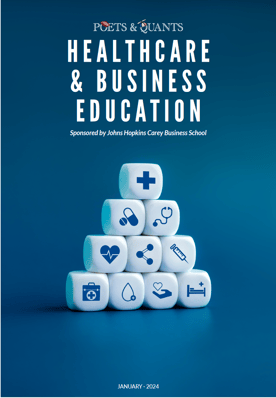Free Downloadable Guide:
The Business of Health

What is the largest industry in the United States?
Chances are, you won’t get the right answer on your first try because it is the business of health. Far larger than finance, consulting or technology, the health sector of the economy generates trillions of dollars in revenue annually. In the U.S. alone, healthcare spending accounts for nearly 20% of the GDP.
And there is no end in sight to future growth in the business of health. An aging population, rising chronic disease rates, and advancements in medical technology ensure that this is a business that continues to expand and touch every aspect of our lives.
Yet, only in recent years, have business schools and business graduates recognized the true force of this vast industry—and the great opportunity that lies within its numerous challenges. A recent survey found that healthcare has now become the fourth largest segment attracting MBA grads, ahead of consumer products, real estate or manufacturing.
“If you look at the type of jobs that our MBAs are able to get, many of them are with hospitals and health systems in senior management roles but many are working as product managers in pharma and medical devices,” says Alex Triantis, dean of Johns Hopkins University’s Carey Business School where the business of health is a strategic priority. “We are
seeing exciting job opportunities for our students.”
Our free downloadable special report, in partnership with Johns Hopkins Carey Business School, provides a glimpse at the role business schools can play in training and educating a new generation of leaders who want to dedicate their lives to the opportunities and challenges of the business of health.
And there is no end in sight to future growth in the business of health. An aging population, rising chronic disease rates, and advancements in medical technology ensure that this is a business that continues to expand and touch every aspect of our lives.
Yet, only in recent years, have business schools and business graduates recognized the true force of this vast industry—and the great opportunity that lies within its numerous challenges. A recent survey found that healthcare has now become the fourth largest segment attracting MBA grads, ahead of consumer products, real estate or manufacturing.
“If you look at the type of jobs that our MBAs are able to get, many of them are with hospitals and health systems in senior management roles but many are working as product managers in pharma and medical devices,” says Alex Triantis, dean of Johns Hopkins University’s Carey Business School where the business of health is a strategic priority. “We are
seeing exciting job opportunities for our students.”
Our free downloadable special report, in partnership with Johns Hopkins Carey Business School, provides a glimpse at the role business schools can play in training and educating a new generation of leaders who want to dedicate their lives to the opportunities and challenges of the business of health.


.png?width=1568&height=2000&name=JHU%20AD%20for%20Report%20Download%20Page%20(1).png)